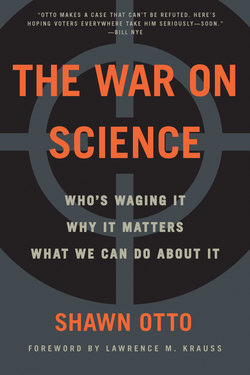Читать книгу The War on Science - Shawn Lawrence Otto - Страница 9
На сайте Литреса книга снята с продажи.
ОглавлениеFOREWORD
“The mind once enlightened cannot again become dark.”
—Thomas Paine
Thomas Paine’s remark above is most certainly true for individuals. This is, after all, the central purpose of education: to lift the veil of darkness for young people, with the hope that once lifted, the enlightenment that results will help build wiser adults, with a brighter communal future.
But what may be true for individuals is not necessarily true for societies. The scientific wisdom of the Greeks was largely abandoned in the Middle Ages. The Arab countries, once the heart of mathematics and scholarship, did not partake in many of the benefits of the European Enlightenment, in part because of the emerging influence of fundamentalism in the tenth and eleventh centuries.
The United States itself was founded by people, like Thomas Paine, Thomas Jefferson, and Benjamin Franklin, for whom science and enlightenment were paramount. As a nation the United States has benefited more than any other because it became a center for technological innovation and progress.
When I was a child, born in the 1950s, emerging as a young man in the 1960s, the allure of science was unmistakable, and it seemed impossible to imagine a time when ideology, myth, superstition, and ignorance might gain the upper hand in determining the future in the developing world.
Yet, as my friend Shawn Otto describes in meticulous detail in this book, there are forces at work coming from many directions that serve to undermine the simple proposition that public policy should be based on rational reflections on sound empirical evidence. From efforts to obstruct the teaching of evolution in schools, the removal of fluoridation in water, restrictions on vaccination, restrictions on other scientific research and related attacks on the efficacy of the scientific enterprise itself, and most recently wholesale and broadly organized efforts to deny the science associated with human-induced climate change, science, as a basis for helping address real-world challenges, has been under attack. Not just from local school boards in rural America, but from a significant fraction of presidential candidates in 2016.
Shawn is not a professional scientist, but he is the epitome of a responsible citizen scientist. We met and came together with several other odd bedfellows in 2007 to form an organization called ScienceDebate 2008 because we felt that the key issues that would really determine the success of the next presidential administration were being ignored in public debate, and we thought it would be worthwhile trying to create an opportunity for the presidential candidates to discuss these issues in a national public forum. The idea caught on among a broad and diverse segment of the population and we came close in our goal. While a televised debate didn’t occur, we did get the candidates from both major parties in the United States to answer a series of questions about science policy that were later posted online, and made nearly a billion media impressions during the course of the campaign.
We have continued our efforts with each presidential campaign, and we remain hopeful, in spite of the obstacles. Shawn has continued to spearhead the program, with unflagging energy and enthusiasm. But he has done more than this. The effort to restore science as an important basis of public policy, and to ensure that the benefits of scientific and technological research continue to promote the health and welfare of the public, have focused his writing.
This book details the long and checkered set of battles that have been won and lost over the years to try and ensure the Enlightenment is not lost in a new dark age. Meticulously documenting case by case, and area by area, this book provides a valuable resource to put our present conundrum in proper perspective.
But in a characteristic manner Shawn does not merely catalogue here a series of problems and challenges. He also outlines a broad set of specific proposals to address these problems. One might not agree with all of his proposals, but the process of exploring them can only help to enlighten readers as to what they might do, and what they might demand their legislatures do, to ensure a reality-based system of government that addresses the real challenges of the twenty-first century. And as Paine emphasized, such enlightenment cannot be darkened. There is thus reason for hope.
Lawrence M. Krauss, 2016
